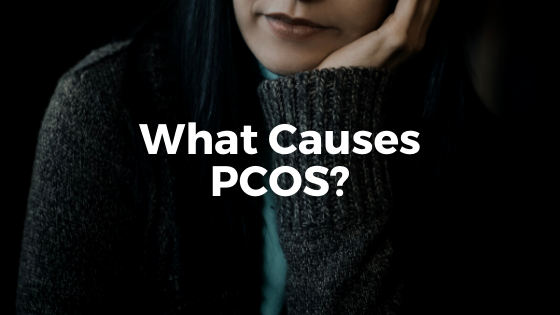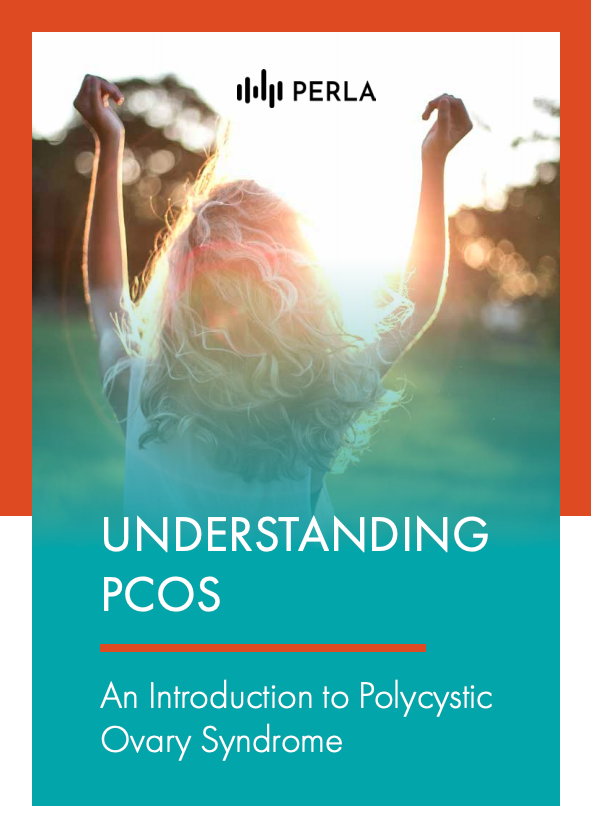Women with polycystic ovary syndrome (PCOS) usually experience a number of different signs and symptoms, such as irregular menstruation, excess hair growth, weight gain, acne, difficulty conceiving, as well as anxiety and depression. But what causes this? And what exactly is PCOS? Find out what the current research says about PCOS and its causes.
What is PCOS?
PCOS affects about 10% of women between the ages of 15 and 44.1 The classic symptoms of PCOS, which include hyperandrogenism (high levels of androgens in the blood) and an irregular menstrual cycle, occur in 15 to 20 percent of women.2 The first symptoms of PCOS may start at around the same time as a woman’s first period, or right after puberty. But most women don’t experience any symptoms until they are in their 20s or 30s.
Despite the fact that PCOS is very common, doctors and researchers still don’t know what causes it. Because of that, it can be very challenging to diagnose, and difficult to treat. In PCOS, this means that currently only the symptoms can be treated, as the underlying cause is not identified yet. Lifestyle changes and weight loss are recommended, as them seem to reduce the overall symptoms and can improve metabolic issues.3
PCOS is a chronic (lifelong) condition that can have serious long-term consequences if not managed properly, which is why it’s important that it is evaluated and treated by a doctor who’s used to seeing patients with PCOS. As PCOS includes a wide range of symptoms, it’s important to work with a multidisciplinary team of specialists. Based on your needs, this team may include OB-GYNs/Gynecologists, reproductive endocrinologists, fertility specialists, dermatologists, dietitians and mental health experts. Together, they can develop a plan to help you manage your symptoms.
Causes of PCOS
What researchers have found about PCOS so far is that is has a genetic component, meaning that the risk for developing PCOS can be inherited. However, there are a lot of other factors that may contribute to the development of PCOS, such as the environment and lifestyle factors.
PCOS is primarily linked to hormonal imbalance, particularly high levels of androgens, such as testosterone, and insulin. We also know that excess weight, PCOS, and insulin resistance often go hand in hand.4 These factors are the focus of current clinical studies on PCOS:
Hormone Imbalance
Androgens
In women with PCOS, the average daily production of androgens is increased.5 High levels of androgens in women can alter ovulation by making it harder for the ovaries to release mature eggs during each menstrual cycle.6 Having menstrual cycles where an ovulation does not occur can contribute to the difficulty to conceive.
Higher-than-normal levels of androgens lead to symptoms such as excess hair growth (hirsutism), acne, and male-pattern hair loss. It is also linked to weight gain, accumulation of fat tissue in the abdomen, and other metabolic issues linked to PCOS.7
Insulin resistance
Most women with PCOS have some degree of insulin resistance. When you have insulin resistance, your body’s cells don’t respond well to insulin and can’t absorb and use blood sugar for energy. To prevent the build-up of sugar in the blood, the pancreas produces more insulin.
High levels of insulin enhance the production of androgens in the ovaries. In addition, elevated insulin and androgen levels stimulate the production of adipokines within the fat tissue.8 These cell-signaling proteins interfere with metabolism and the breakdown of fats, which further enhance insulin resistance.
Genetics
PCOS runs in families. You may have a mother, sister, or daughter with similar symptoms. While heredity may play a role in the development of PCOS, no single gene has been identified to cause PCOS. It is likely that multiple genes are involved, each of which probably makes only a small contribution to the development of PCOS and its symptoms.9
Excess Weight
Excess weight makes almost all PCOS symptoms worse, and has an important role in the risk for the development of diabetes and heart disease. If you want to lower your risk for future health complications, it is recommended to focus on lifestyle management and maintain it lifelong. If you have excess weight, many specialists recommend weight reduction as a first line treatment. Even modest weight loss of 5 – 10% can result in decreased androgen and insulin levels, which may help with restoring ovulation and normal menstrual cycle. If you want to change your weight, it’s a good idea to work with a dietitian that is experienced in PCOS.
Conclusion
So far, the researchers were not able to determine the specific cause for PCOS. The most widely accepted hypothesis suggests that it is caused by multiple factors, where interactions between the environment, genetics, and lifestyle factors eventually may lead to the development of PCOS. If you are experiencing the symptoms of PCOS or have been diagnosed with PCOS, it’s a good idea to stay in touch with your doctors or PCOS care team to manage your symptoms and help you get better.
Sources:
- Office on Women’s Health. Polycystic ovary syndrome | Womenshealth.gov. womenshealth.gov. Published April 2019. https://www.womenshealth.gov/a-z-topics/polycystic-ovary-syndrome
- Fauser B, Tarlatzis B, Rebar RW, et al. Consensus on women’s health aspectsof polycystic ovary syndrome (PCOS): the Amsterdam ESHRE/ASRMsponsored 3rd PCOS Consensus Workshop Group. Fertil Steril. 2012;97(1):28–38e25.
- Norman RJ, Davies MJ, Lord J, Moran LJ. The role of lifestyle modification in polycystic ovary syndrome. Trends Endocrinol Metab. 2002;13(6):251-257. doi:10.1016/s1043-2760(02)00612-4
- Rojas J, Chávez M, Olivar L, et al. Polycystic Ovary Syndrome, Insulin Resistance, and Obesity: Navigating the Pathophysiologic Labyrinth. International Journal of Reproductive Medicine. 2014;2014:1-17. doi:10.1155/2014/719050
- Taylor HS, Fritz MA, Lubna Pal, Emre Seli. Speroff’s Clinical Gynecologic Endocrinology and Infertility. 9th ed. Wolters Kluwer; 2020.
- Polycystic ovary syndrome: MedlinePlus Medical Encyclopedia. Medlineplus.gov. Published 2016. https://medlineplus.gov/ency/article/000369.htm
- Lobo RA. Polycystic ovary syndrome. In: Lobo RA, Gershenson DM, Lentz GM, Valea FA, eds. Comprehensive Gynecology. 7th ed. Philadelphia, PA: Elsevier; 2017:chap 41.
- Carmina E. Obesity, adipokines and metabolic syndrome in polycystic ovary syndrome. Front Horm Res. 2013;40:40-50. doi:10.1159/000341840
- Legro RS. Evaluation and Treatment of Polycystic Ovary Syndrome. PubMed. Published 2000. Accessed February 4, 2021. https://www.ncbi.nlm.nih.gov/books/NBK278959


